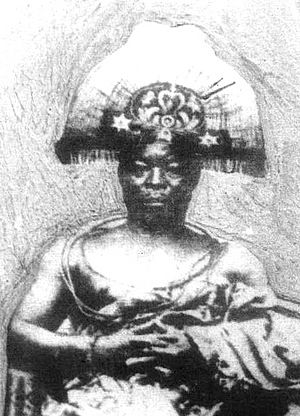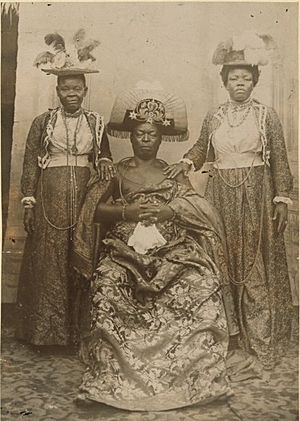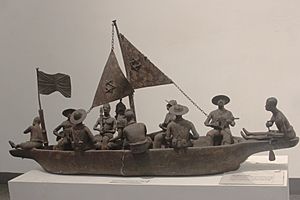Ovonramwen facts for kids
Quick facts for kids Ovonramwen |
|
|---|---|
 |
|
| Reign | 1888–1897 |
| Predecessor | Adolo (r. 1848–1888) |
| Successor | Eweka II |
| Born | c. 1857 |
| Died | 1914 Calabar |
| House | Oranmiyan |
Ovonramwen Nogbaisi (ruled 1888–1897), also known as Overami, was the Ọba (king) of the Kingdom of Benin. He ruled until 1897 when a British expedition arrived.
He was born around 1857. His father was Ọba Adọlọ. When he became king in 1888, he took the name Ovọnramwẹn Nọgbaisi. Every Ọba chose a new name at their coronation. Ovọnramwẹn means "The Rising Sun," and Nọgbaisi means "which spreads over all."
In the late 1800s, the Kingdom of Benin was still independent. The Ọba controlled all trade, which the British did not like. British investors wanted Benin's natural resources. These included palm-oil, rubber, and ivory. British officials like Vice-Consul James Robert Phillips wanted Britain to take over Benin. They also wanted to remove the Ọba from power.
Contents
British Actions in Benin
In 1896, a British group led by Phillips planned to overthrow the Ọba. Their weapons were hidden in bags. The soldiers pretended to be porters. Phillips wanted to enter Ovonramwen's palace by saying he wanted to talk.
Warnings and Conflict
Ovonramwen's messengers warned Phillips not to enter Benin territory. They said the Ọba could not meet him due to important duties. Phillips was warned several more times. He then sent his walking stick to the Ọba. This was a serious insult meant to start a conflict.
Phillips's group was attacked. Many members of his group were lost. After this, a large British military operation began in 1897. This operation was led by Harry Rawson.
Impact on Benin City
During the military action, Benin City was damaged by fire. The royal palaces were also affected. Many valuable items, including the famous Benin Bronzes, were taken. Many people living in the city were also impacted.
The British had orders to capture the Ọba. Ovonramwen managed to escape at first. He hid in the forest for six months. On August 5, 1897, he returned to the city to surrender.
Surrender and Offer
When Ovonramwen returned, he was richly dressed. He wore many coral beads. He was also with a large group of people. He tried to avoid being sent away. He offered Consul General Ralph Moor 200 barrels of oil. This was worth about £1500 at the time. He also offered to show where 500 ivory tusks were buried. These tusks were worth more than £2 million then. However, Moor refused the offer. He had already found the tusks.
Life in Exile
Ovonramwen was sent away to Calabar. He went with two of his wives, Queen Egbe and Queen Aighobahi. In Calabar, he was hosted in a small place called Essien Town. Etinyin Essien Etim Offiong welcomed him there.
Ovonramwen passed away in Calabar in early 1914. He was later buried at the royal palace in Benin City. His first son, Prince Aguobasimwin, became the next king. He ruled as Eweka II.
 | Chris Smalls |
 | Fred Hampton |
 | Ralph Abernathy |



